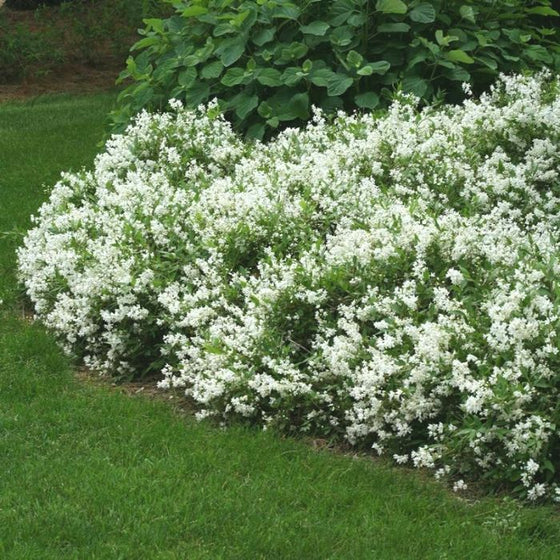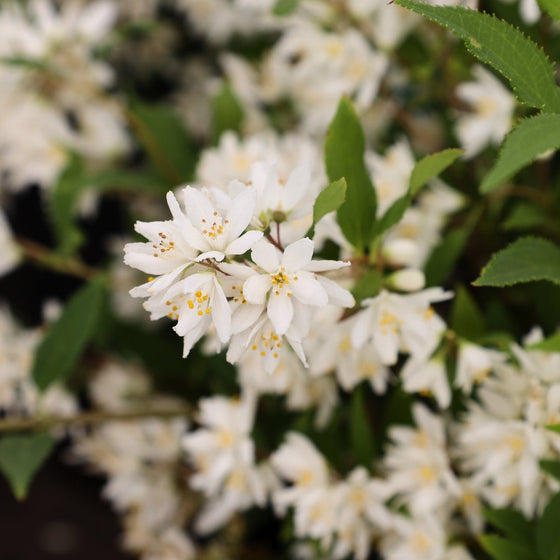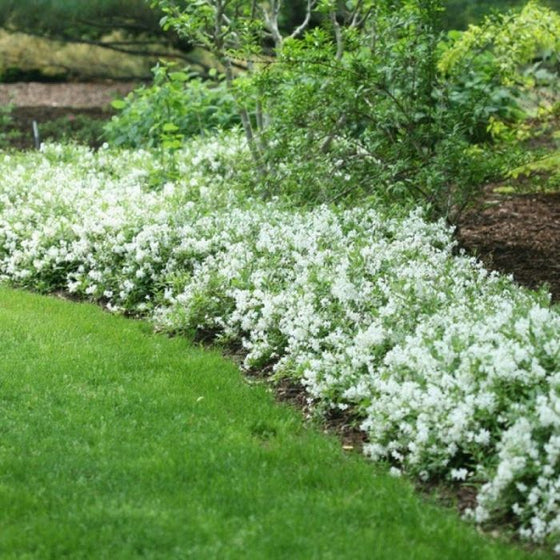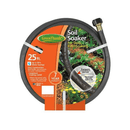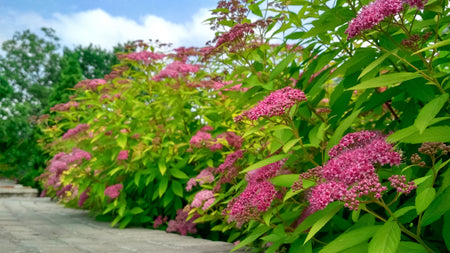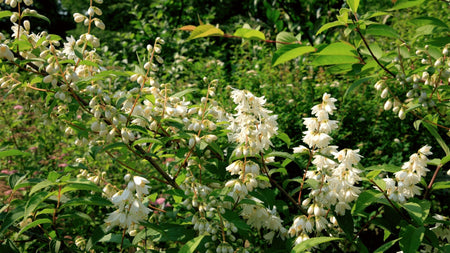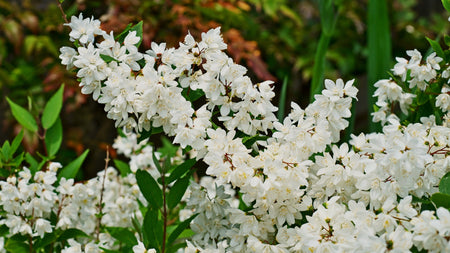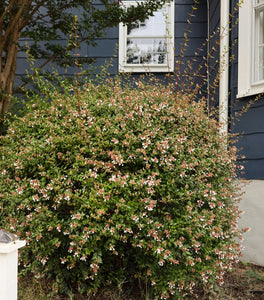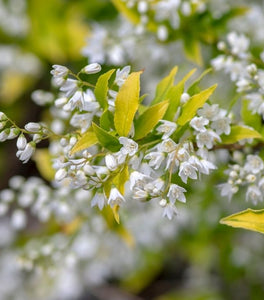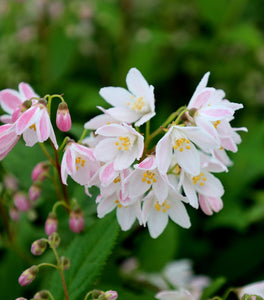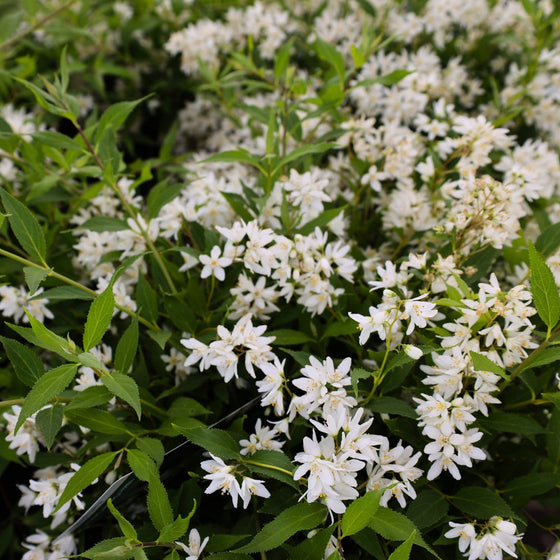
Images Depict Mature Plants
Deutzia Nikko for Sale Online
Deutzia Nikko is a compact, deciduous shrub that delivers a stunning display of pure white, star-shaped flowers in late spring. Its low-growing, mounding form reaches a height of 1 to 2 feet and spreads up to 2 to 5 feet, making it an excellent choice for ground cover, borders, or rock gardens. During the blooming season, Deutzia Nikko is covered in clusters of small, fragrant flowers, creating a brilliant carpet of white that attracts pollinators like bees and butterflies. Its cascading branches add texture and movement to any landscape, offering beauty and function.
Thriving in full sun to partial shade, Deutzia Nikko prefers well-drained soil but is adaptable to various soil conditions. This versatile shrub is hardy in USDA zones 5-8 and is drought-tolerant once established, making it a low-maintenance option for gardeners. In addition to its stunning spring flowers, Deutzia Nikko offers year-round interest with its lush green foliage turning shades of burgundy and purple in the fall. Its compact size makes it perfect for small gardens, mass plantings, or as an accent plant in mixed borders.
With minimal care, Deutzia Nikko will thrive and have a long-lasting impact on your garden. Pruning immediately after flowering helps maintain its shape and encourages healthy growth. This deer-resistant shrub is also easy to care for, requiring little more than regular watering during the first growing season. Whether you’re looking for a low-growing shrub to enhance a garden bed or to provide a floral ground cover, Deutzia Nikko offers a profusion of blooms and vibrant seasonal interest with minimal upkeep.
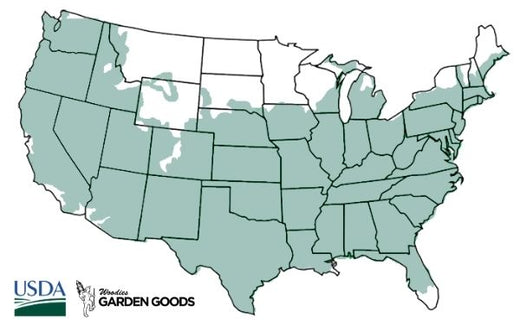
| Hardiness Zone: | 5-8 |
|---|---|
| Mature Height: | 1.5 to 2 Feet |
| Mature Width: | 4 to 5 Feet |
| Classification: | Deciduous shrub, spring flowering |
| Sunlight: | Full to part sun |
| Habit: | Compact spreading |
| Foliage: | Green; burgundy in Fall |
| Flower Color: | Pure white |
| Pruning Season: | Prune in summer after flowering |
| Soil Condition: | Any well drained slightly moist |
| Water Requirements: | Water well until established |
| Uses: | Extremely attractive when planted in a mixed border, or as a specimen plant |
How to Care for Deutzia Nikko
Be sure to read our planting instructions to ensure a healthy and happy Deutzia Nikko for years to come!
How do I water Deutzia Nikko Shrubs?
To properly water Deutzia Nikko shrubs, it's essential to keep the soil consistently moist, especially during the first growing season. Water the shrub deeply once or twice a week, depending on rainfall, ensuring the water reaches the root zone. Focus on watering at the base of the plant rather than overhead to prevent leaf moisture, which can lead to fungal issues. If the top 2-3 inches of soil feel dry to the touch, it’s time to water. Well-drained soil is crucial for Deutzia Nikko, as the plant doesn’t tolerate soggy conditions well. Once established, Deutzia Nikko becomes more drought-tolerant and requires less frequent watering. During periods of extended heat or drought, continue to water deeply every 10 to 14 days to keep the plant healthy and blooming. Be careful not to overwater, as too much moisture can cause root rot. Adding mulch around the base of the shrub helps retain soil moisture, reduce evaporation, and maintain even soil temperature. Proper watering will ensure that your Deutzia Nikko stays vibrant, with lush green foliage and abundant blooms each season.
How do I plant a Deutzia Nikko Shrubs?
To plant Deutzia Nikko shrubs, begin by selecting a location that offers full sun to partial shade and well-drained soil. This shrub thrives in areas with good sunlight for abundant blooms but can tolerate some shade. Start by digging a hole that is twice as wide and as deep as the root ball, allowing enough room for the roots to spread. Gently place the shrub in the hole, ensuring the top of the root ball is level with or slightly above the surrounding soil. Backfill the hole with soil, pressing it down lightly to remove air pockets, and water thoroughly to help the roots settle. For optimal growth, space multiple Deutzia Nikko shrubs about 2 to 5 feet apart if you’re planting them as ground cover or in a mass planting. Once planted, apply a 2-3 inch layer of mulch around the base to retain moisture, suppress weeds, and regulate soil temperature. Be sure to keep the mulch a few inches away from the stem to prevent rot. During the first growing season, water the shrub regularly to establish a strong root system. With the right care and placement, Deutzia Nikko will thrive, providing beautiful white blooms in spring and colorful foliage in the fall.
How do I fertilize Deutzia Nikko?
To fertilize Deutzia Nikko, apply a balanced, slow-release fertilizer, such as a 10-10-10 or 12-12-12 formula, in early spring just before new growth begins. This provides the essential nutrients for healthy foliage and abundant blooms. Spread the fertilizer evenly around the base of the shrub, keeping it a few inches away from the stems to prevent root burn. Water the area thoroughly after applying the fertilizer to help the nutrients absorb into the soil. Deutzia Nikko is a low-maintenance shrub, and one feeding per year is typically enough to keep it thriving throughout the growing season. If you prefer an organic approach, compost or well-rotted manure can also be used to fertilize Dwarf Deutzia Nikko. Simply work a thin layer of compost into the soil around the plant in early spring. Be careful not to over-fertilize, as too much nitrogen can result in excessive foliage growth at the expense of blooms. A light application of fertilizer or compost in spring will encourage the shrub to produce its stunning white flowers and maintain healthy green foliage throughout the growing season. With proper fertilization, your Dwarf Deutzia Nikko will thrive and continue to enhance your landscape with minimal care.

How do I prune Deutzia Nikko?
To prune Deutzia Nikko, the best time is immediately after it finishes blooming in late spring or early summer. Since this shrub blooms on old wood, pruning right after the flowering season allows it to set buds for the following year without disrupting its blooming cycle. Start by removing any dead, damaged, or diseased branches, cutting them back to healthy growth. You can also lightly trim back the tips of the branches to shape the shrub and control its size, making sure not to cut more than one-third of the plant to avoid stressing it. If Deutzia Nikko becomes overgrown or you want to rejuvenate it, you can perform a more extensive pruning by cutting back some of the older, thicker stems at ground level. This encourages new, vigorous growth and helps maintain the shrub’s compact, mounding form. Be sure to remove any crossing or crowded branches to improve air circulation, which reduces the risk of fungal diseases. Regular pruning keeps Deutzia Nikko looking neat and encourages a profusion of beautiful white blooms each spring.

